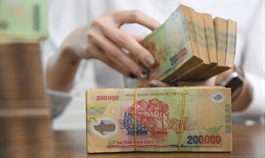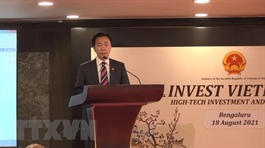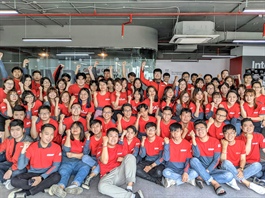Rent strangles HCMC's jobless migrants
Rent strangles HCMC's jobless migrants
Ha Van Hong and his wife, both in their 60s, have been unemployed since HCMC applied social distancing in late May.
Hong used to work as a mason and his wife as a street-food vendor. They live in a rented apartment in Tan Chanh Hiep Ward of District 12.
Their income was enough to survive day to day.
Ever since losing their jobs following the latest Covid-19 outbreak in the city, the couple could only cover their rent for the first month.
"In late June, all we had left was a little over VND2 million ($87.77) - just enough for rent. So far, we have relied on charity meals."
Though their landlord had cut the rent for July by VND300,000, the couple still had to ask for an extension.
"With social distancing to last until Sept. 15, we have no idea when we could get our jobs back."
"It is a shame we could not pay rent but our hands are tied. If the landlord kicks us out, we will have to accept it, we cannot blame anyone," he said.
Rent in HCMC, accounting for 15-20 percent of migrant workers' income, has become a heavy burden to many who have been out of job amid Covid-19.
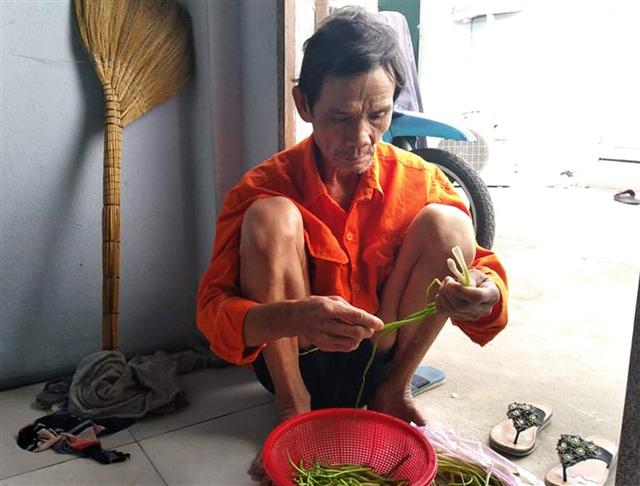
Ha Van Hong prepares food at his rented apartment in HCMC's District 12. Photo by VnExpress/An Phuong
|
For over a month now, Ho Chi Minh City has been the epicenter of the ongoing Covid-19 wave that hit in late April.
Since May 31, HCMC has applied social distancing measures at different levels, during which it has suspended all non-essential services, shut down street-side markets, banned takeaways and all ride-hailing services.
Sharing a rented apartment with her husband on Huynh Tan Phat Street in Tan Thuan Dong Ward of District 7, Le Thi To Quyen, 29, has no idea how to pay rent this month.
"The rent is what I worry about most, not food. I’m really afraid we would lose our home in the middle of the pandemic."
Quyen said she and her husband have been relying on charity meals, and for the past two months, have spent as little as possible to save up for rent.
In late June, the factory where she works in Tan Thuan Export Processing Zone had to suspend several departments after employees contracted Covid-19. Quyen was laid off with VND3 million.
Ten days later, her husband lost his job as a driver and because he worked without a contract, received zero compensation.
Quyen said rent, along with power and water bills, cost them VND2.7 million per month.
Last month, the landlord reduced the rent for her apartment by VND500,000 but that was not enough.
"We have not made any money for over a month – over VND2 million in rent is a real burden! We planned on returning home [to the Mekong Delta province of Long An], but that is not an option since we're not allowed to leave HCMC."
Late last year, a survey of more than 1,000 respondents, including migrant workers, business owners, and landlords by the HCMC Federation of Labor revealed workers spent around 15-20 percent of their monthly incomes on rent.
A recent survey by the body showed around 1.5 million families are experiencing difficulties and are in need of financial support.
Tran Thi Dieu Thuy, chairwoman of the federation, said on average, a migrant worker has to pay around VND1.5 million per month in rent, electricity and water, their biggest burden, especially among those to have lost their jobs to the pandemic.
The city has gone three months under different levels of social distancing measures and as a result, many people have been left unemployed while still renting apartments in HCMC.
She said the city’s trade union has provided food and essential products to migrant workers while local authorities have urged landlords to cut rent.
The union itself has called on 670 landlords to cut more than VND5 billion in rent for nearly 36,000 residents.
Hoang Tung, chairman of Thu Duc City, said since June, local authorities have convinced landlords to cut VND45 billion in rent for 56,000 households.
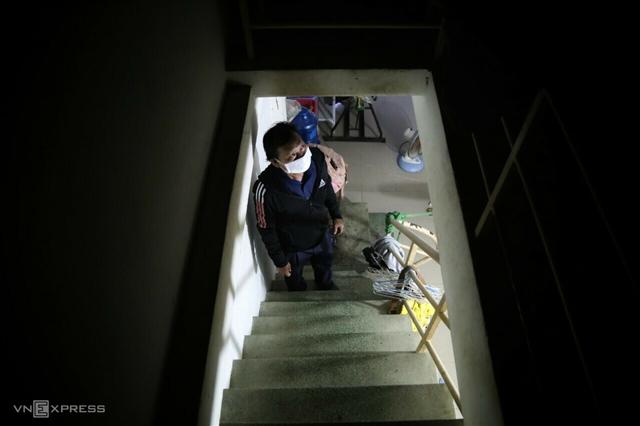
Huynh Van Son, a migrant worker from the south central Binh Dinh Province, looks up to an attic of around 15 square meters that he rents for VND1.5 million ($66) a month in HCMC, August 15, 2021. Photo by VnExpress/Dinh Van
|
Le Duy Binh, CEO of market research company Economica Vietnam, said in order to reduce pressure and help tenants feel secure to "stay still and fight the pandemic", the city government should consider telling all landlords to cut rent as an urgent support package.
Along with supporting tenants, the city should also provide tax exemption to landlords so rents could be sufficiently lowered.
Landlords would only need to provide lists of tenants exempt from rent or offered cuts during the social distancing period to enjoy a tax exemption, he suggested.
"Electricity, water, and communication bills should also be cut to assist the poor," he urged.
HCMC has asked the government for a relief package of VND28 trillion and 142,200 tons of rice for over 4.7 million people.
The money is expected to cover food and rent to help poor working families, especially migrants, survive the pandemic social distancing impacts, and prevent them from trying to leave the city in droves as seen in recent days, the city said Tuesday in a proposal sent to the government and ministries of Finance and Labor-Invalids-Social Affairs.
In the past two months, aside from a government relief package of VND26 trillion in July, HCMC has issued two of its own packages valued at VND1.8 trillion in total to help the poor as well as businesses hit by the pandemic.






